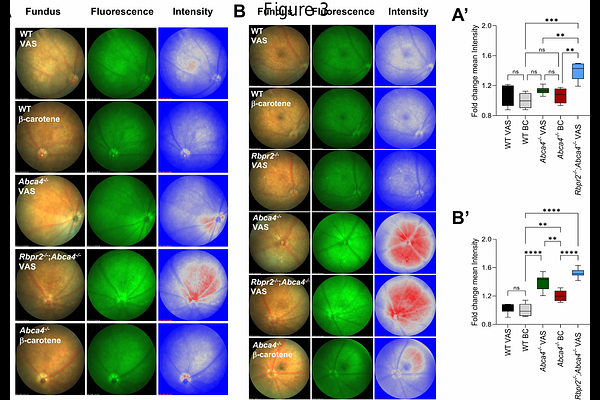Rescue of the Stargardt Disease phenotype in Abca4 knockout mice through dietary modulation of the vitamin A receptor RBPR2

Rescue of the Stargardt Disease phenotype in Abca4 knockout mice through dietary modulation of the vitamin A receptor RBPR2
Radhakrishnan, R.; Leung, M.; Yochim, D.; Roehrich, H.; McPherson, S. W.; Lobo, G. P.
AbstractMutations in the ABCA4 gene in Stargardt disease (STGD1) causes accumulation of cytotoxic lipofuscin, resulting in RPE atrophy and photoreceptor dysfunction. One component of lipofuscin is the all-trans-retinal derivative, bisretinoid N-retinylidene-N-retinylethanolamine (A2E). Since ocular A2E biosynthesis relies on circulating all-trans-retinol bound to retinol binding protein 4 (RBP4-ROL), we hypothesized that modulating vitamin A receptors, such as the retinol binding protein receptor 2, RBPR2, which regulate serum RBP4-ROL concentration, should attenuate A2E production. In-silico analysis revealed multiple retinoic acid response element (RARE) binding sites on the murine Rbpr2 gene promotor, which was confirmed in vitro by EMSA and ChIP assays. In vitro luciferase assays showed that Rbpr2 promotor activity was induced by exogenous {beta}-carotene (BC) metabolites. Dietary BC supplementation of Abca4-/- mice, a mouse model for STGD1, increased hepatic all-trans-retinoic acid and 9-cis-retinoic acid production, which induced Rbpr2 mRNA expression. This mechanism decreased serum RBP4 protein levels, fundus autofluorescence (AF) and ocular A2E accumulation, altogether improving photoreceptor and RPE function. Conversely, such a rescue was not observed in either Abca4-/- mice fed a diet devoid of BC or in double knockout Rbpr2-/-;Abca4-/- mice. Thus, there was a significant inverse correlation between dietary BC supplementation and Rbpr2 gene presence in Abca4-/- mice, to that of lipofuscin accumulation in Abca4-/- mice on diets devoid of BC or in Rbpr2-/-;Abca4-/- mice. Our results provide impetus to pursue BC supplemented diets as therapeutic interventions for STGD1 patients with ABCA4 gene mutations and identifies a novel role for the vitamin A receptor RBPR2 in this process.